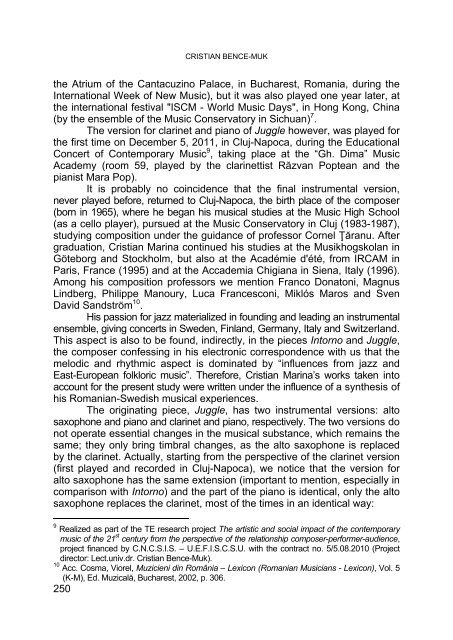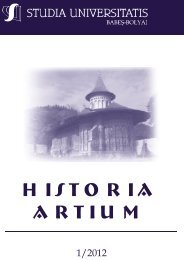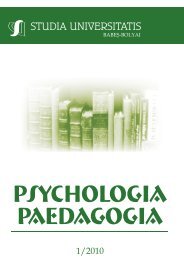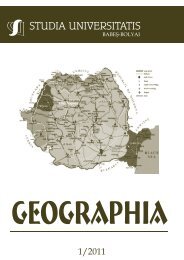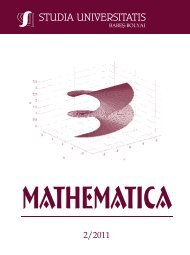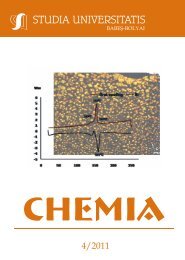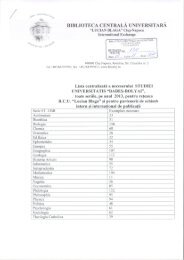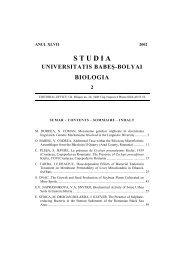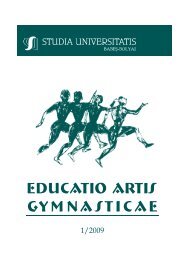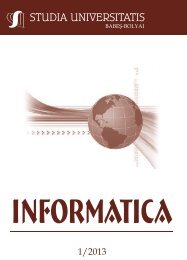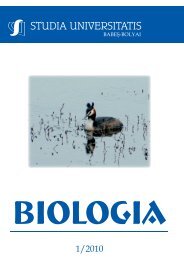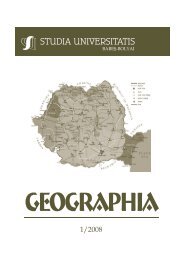musica - Studia
musica - Studia
musica - Studia
Create successful ePaper yourself
Turn your PDF publications into a flip-book with our unique Google optimized e-Paper software.
CRISTIAN BENCE-MUK<br />
the Atrium of the Cantacuzino Palace, in Bucharest, Romania, during the<br />
International Week of New Music), but it was also played one year later, at<br />
the international festival "ISCM - World Music Days", in Hong Kong, China<br />
(by the ensemble of the Music Conservatory in Sichuan) 7 .<br />
The version for clarinet and piano of Juggle however, was played for<br />
the first time on December 5, 2011, in Cluj-Napoca, during the Educational<br />
Concert of Contemporary Music 9 , taking place at the “Gh. Dima” Music<br />
Academy (room 59, played by the clarinettist Răzvan Poptean and the<br />
pianist Mara Pop).<br />
It is probably no coincidence that the final instrumental version,<br />
never played before, returned to Cluj-Napoca, the birth place of the composer<br />
(born in 1965), where he began his <strong>musica</strong>l studies at the Music High School<br />
(as a cello player), pursued at the Music Conservatory in Cluj (1983-1987),<br />
studying composition under the guidance of professor Cornel Ţăranu. After<br />
graduation, Cristian Marina continued his studies at the Musikhogskolan in<br />
Göteborg and Stockholm, but also at the Académie d'été, from IRCAM in<br />
Paris, France (1995) and at the Accademia Chigiana in Siena, Italy (1996).<br />
Among his composition professors we mention Franco Donatoni, Magnus<br />
Lindberg, Philippe Manoury, Luca Francesconi, Miklós Maros and Sven<br />
David Sandström 10 .<br />
His passion for jazz materialized in founding and leading an instrumental<br />
ensemble, giving concerts in Sweden, Finland, Germany, Italy and Switzerland.<br />
This aspect is also to be found, indirectly, in the pieces Intorno and Juggle,<br />
the composer confessing in his electronic correspondence with us that the<br />
melodic and rhythmic aspect is dominated by “influences from jazz and<br />
East-European folkloric music”. Therefore, Cristian Marina’s works taken into<br />
account for the present study were written under the influence of a synthesis of<br />
his Romanian-Swedish <strong>musica</strong>l experiences.<br />
The originating piece, Juggle, has two instrumental versions: alto<br />
saxophone and piano and clarinet and piano, respectively. The two versions do<br />
not operate essential changes in the <strong>musica</strong>l substance, which remains the<br />
same; they only bring timbral changes, as the alto saxophone is replaced<br />
by the clarinet. Actually, starting from the perspective of the clarinet version<br />
(first played and recorded in Cluj-Napoca), we notice that the version for<br />
alto saxophone has the same extension (important to mention, especially in<br />
comparison with Intorno) and the part of the piano is identical, only the alto<br />
saxophone replaces the clarinet, most of the times in an identical way:<br />
9 Realized as part of the TE research project The artistic and social impact of the contemporary<br />
music of the 21 st century from the perspective of the relationship composer-performer-audience,<br />
project financed by C.N.C.S.I.S. – U.E.F.I.S.C.S.U. with the contract no. 5/5.08.2010 (Project<br />
director: Lect.univ.dr. Cristian Bence-Muk).<br />
10 Acc. Cosma, Viorel, Muzicieni din România – Lexicon (Romanian Musicians - Lexicon), Vol. 5<br />
(K-M), Ed. Muzicală, Bucharest, 2002, p. 306.<br />
250


